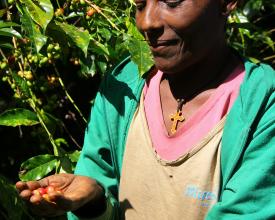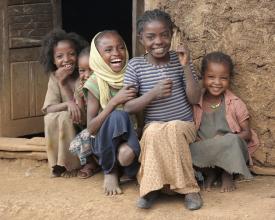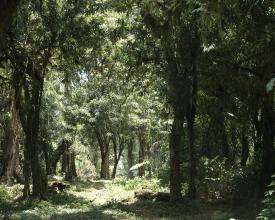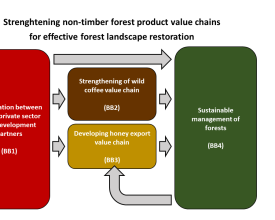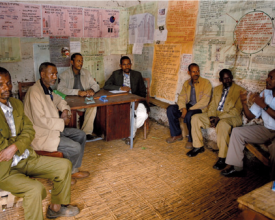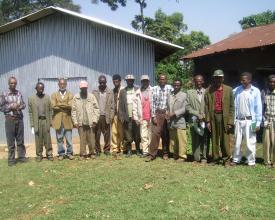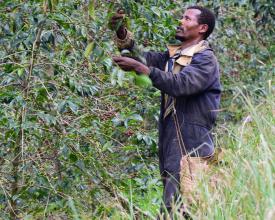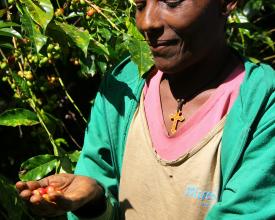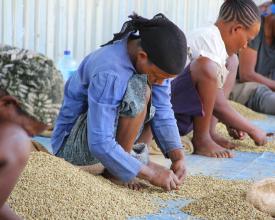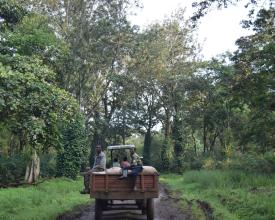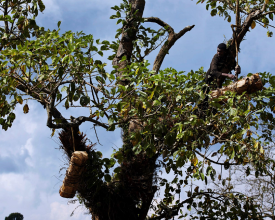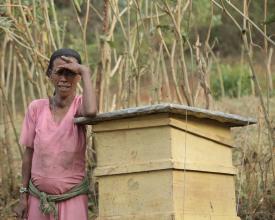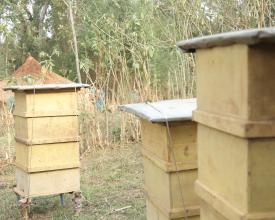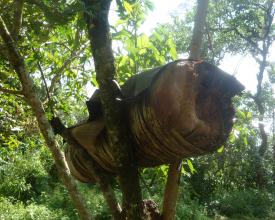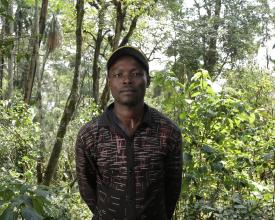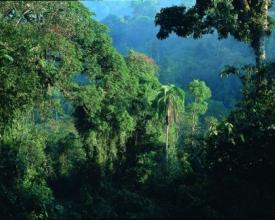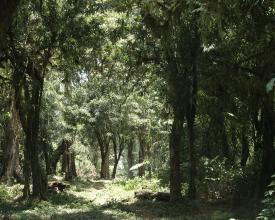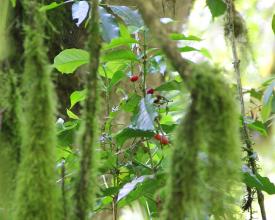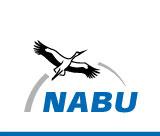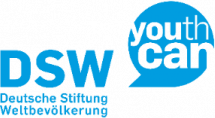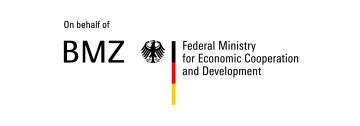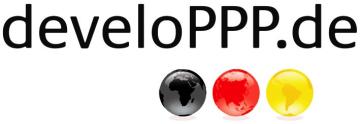
Promotion of sustainable forest products from biosphere reserves in Ethiopia – a unique case for business partnerships
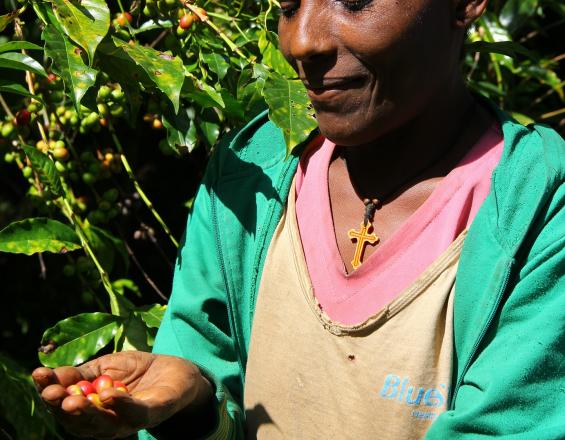
The majority of Ethiopia’s population depends on agriculture to sustain their livelihoods. Pressure on land is high and income from forests can often not compete, leading to deforestation and land degradation. The last mountain forests – home of wild coffee trees - are threatened. Exporting high value forest products provides incentives for effective forest protection and management.
This solution describes a business case relevant for forest landscape restoration (FLR). A public-private partnership between local producers, farmer’s organizations, German companies and NGOs and GIZ provided the framework conditions to develop wild coffee and honey value chains in Kafa and Sheka.
Efforts led to the recognition of Kafa region as UNESCO biosphere reserve, a unique example where small-scale farmers and grass roots organizations have become global business partners. Forests are valued and preserved as they provide a substantial and regular income to farmers by selling forest products.
Context
Challenges addressed
Environmental:
- Pressure on land is high due to high population growth and inappropriate farming methods and overgrazing leading to decreasing soil fertility, and erosion
- More than 30,000 ha of soil are lost to erosion every year in Ethiopia. Arable and grazing land is becoming unproductive, resulting in declining agricultural productivity. The situation is exacerbated by climate change impacts such as droughts
Social & economic:
- Public finance available is not sufficient; private investment is essential but still lacking
- Investments of private sector in land- & forest use focuses on short-term gains
- There was no access to international markets & buyers willing to pay higher prices for good quality products
- Investors promote cultivated coffee from gardens and plantations, threatening to displace the wild coffee and harm the ecosystem
Location
Process
Summary of the process
The setup of a cooperation structure between partners (BB1) provided the foundation for the development of sustainable wild coffee (BB2) and honey value chains (BB3). Current and potential revenues obtained from the sale of these forest products provide additional incentives for sustainable management of the forests in the biosphere reserves (BB4). Participatory Forest Management User Groups were involved in the trade and the system proofed to be a helpful tool in protecting the natural resources required for setting up sustainable value chains.
Building Blocks
Cooperation between communities, private sector and development partners
The partnership was set up by using a multi-stakeholder approach involving a wide range of actors such as communities from the regions, private partners from Germany (Original Food), local administration and public authorities (e.g. Ethiopian Wildlife Conservation Authority) as well as partners from civil society (NABU, GEO Protects the Rainforest) and international partners (GIZ on behalf of BMZ). The partnership took advantage of the specialized know-how and networks of its members combining knowledge about local production, international quality standards, administrative procedures, capacity development and process advice.
A cooperative structure was set up jointly with local administrations helping farmers to export the forest products. Now, the majority of smallholders is organised in cooperatives and the project partners work closely with unions to establish a quality assurance system for the supply chains.
Both the smallholders and the employees of the cooperatives and unions receive trainings to extend their knowledge and take over the tasks in the new value chains. The economic activities were accompanied by several social projects such as family planning, youth centres HIV/AIDS prevention initiatives etc.
Enabling factors
- The initiative is in line with goals of government to preserve the country`s unique biodiversity and reduce environmental threats
- Clear long-term interest and trustful relationship between Original Food with farmers, cooperatives and unions since 2003
- Concept of economic incentive and protection through sustainable use of natural resources
- Close collaboration with local population and entities
- Broad knowledge and experience from all different partners combined
Lesson learned
- The mode of collaboration was highly innovative as it successfully created a linkage between economic regional development and environmental sustainability, between local population and attractive, long-term income opportunities through the protection of the rainforest
- Today, more than ¼ of the PFM area is closely linked to the wild coffee trade, all 324 PFM user groups have additionally been trained to support the forest conservation
- Direct cooperation between private companies and small-scale farmers helped to empower them and secure access to the European market
Developing a wild coffee value chain
The business model is based on trading, value adding and promoting specialty wild coffee on the European market, which is handpicked from the original coffee forests. Value chain development involved the following steps:
- Build up and strengthen collaboration with local farmers
- Identification of suitable collection areas based on resource availability, forest coffee conservation needs & accessibility.
- Training on a) harvesting (picking + separation); b) post harvest handling (separation, drying, sorting and spreading on drying beds
- Training on the use of central drying station on cooperative level, site selection and training on the setting up of raised beds
- Training on certification requirements (organic wild collection and fair trade certifications) and setup of an internal control system
- Advise and support cooperatives and unions to fulfil certification standards
Enabling factors
- Clear demand for high quality wild coffee by consumers and business sector
- Growing demand of specialty coffee approaching 10% of world consumption, gaining market share rapidly
- Reliable partnership between unions and Orignal Food
- Successful examples of strong and exporting coffee trade unions in Ethiopia bringing benefits to their members
- Use restrictions of BR buffer zones according to UNESCO
- Local smallholders engaged in PFM groups receive official user rights over the forest areas & direct access to forest products
Lesson learned
- Limited finance sources are the major problem for producing and exporting higher quantities of wild coffee. Local banks are limited in giving loans to unions and producers.
- Using central drying stations allows successful separation of wild forest coffee from semi-forest and garden coffee and a considerable quality improvement
- The whole value-chain is owned by producers and their umbrella structures. This is a unique example where grass roots organizations have become global business partners
- More and more smallholders are involved in the trade and the export volume of certified wild coffee keeps increasing;
Developing a honey export value chain
Honey export value chains have been developed according to the following stepwise approach:
- Selection of cooperatives
- Training model farmers in pre-and post-harvesting quality management, organic certification and internal controlling system, traceability system to fulfill EU-quality parameters
- Provision of food grade and quality improving equipment (packaging & processing equipment, solar lamps, food grade honey bags, presses etc.)
- Provide technical expertise from Germany to smallholders, their cooperatives and unions in honey processing and fulfilling the export requirements (e.g. honey water content control)
- Support the unions to acquire an export license, organic certificate and risk management certificate plus other necessary requirements from the Ethiopian government in order to implement the export process
- Communication to veterinarians and other inspection authorities on EU-level by German partners to allow future import of Ethiopian honey
- Constantly monitor and guide honey unions, laboratories and authorities during the export procedure
- Establish a contact to the shipping line by German partners and prepare honey export logistics
Enabling factors
- Trust between local farmer unions and international companies and advisors
- Clear demand for high quality honey by business sector in Germany
- Higher demand for organic honey in Europe due to lower export rates from Latin America & Asia as honey production is increasingly meeting domestic demands
- Use restrictions of BR buffer zones according to UNESCO
- Local smallholders engaged in participatory forest management (PFM) groups receive official forest user rights & direct access to products
Lesson learned
- The interplay between local expertise and international know how resulted in a successful set up of value chains. It was crucial to conduct very detailed trainings with producers especially on post-processing to achieve high quality honey
- Local prices for honey are high which made the price negotiations difficult for the international buyer
- The ownership of the whole “value-chain” from the grass root producer up to the loading the coffee bags onto a vessel for the overseas market is owned by the producers and their representative umbrella structures. This is a unique example where grass roots structures have become global business partners
- Meeting the EU quality standards needs constant checks of honey producing methods. Producers mostly achieved fulfilling the quality standards and delivered 42 Mt of honey. The rest of the honey has been sold to local traders for the local market or other purposes resulting in additional but lower revenues as exported honey
Protection and sustainable management of forests
The protection and sustainable management of forests within the biosphere reserve was accompanied by the active promotion of Participatory Forest Management (PFM) and integration of PFM user groups into the trade with wild coffee and honey. The following activities were conducted:
- Implement Participatory Forest Management in the region with the help of local authorities
- Record data on activities of NGOs active in the environmental sector in the regions Kafa, Sheka, Bench Maji, Yayu. Identify possible partners for the upscaling of the coffee & honey value chain
- Establish cooperation with Biosphere reserve authorities to strengthen PFM support within BR boundaries
- Assess the existing PFM user groups, analysing and recording their potential to supply wild coffee and honey and their administrative structures.
- Select existing best performing PFM user groups in wild coffee collection and honey processing.
The conservation aspect through the PFM aims at the sustainable use of the natural resource base and contributes as such to the preservation of biodiversity in one of the 34 internationally identified “biodiversity hotspots”.
Enabling factors
- Forest establishment and conservation, sustainable forest management and landscape rehabilitation is a national priority
- National guidelines on participatory forest management (PFM) have been put in place
- Kafa and Sheka received biosphere reserve status in 2009, a legal basis for protecting & managing forests
- Exchange visits between biosphere reserves to learn and identify PFM options
- Partnerships with other projects (e.g. GIZ and FarmAfrica) supporting biosphere reserves and PFM
Lesson learned
- Participatory Forest Management was introduced and proofed to be a useful tool for collaboration, co-management and benefit sharing of forest resources
- Participation and ownership of local people in sustainable, long-term management of forests has been remarkably demonstrated at field level; communities invested time and labour, they participated in the planning process leading to empowered, legalized and derived benefits from the intervention approaches
- Members of other cooperatives, who are not members of PFM groups still access forest area in the reserves; as their access is traditionally secured through the hereditary system, working with and training these cooperatives also contributed to forest protection even if not under the umbrella of the PFM system
- For multi-stakeholder commitment within sustainable forest management system, government institutions need further strengthening to facilitate administrative support and conflict resolutions
Impacts
Environmental:
- 57,164 ha natural montane forestland managed sustainably
- >= 300 Participatory Forest Management user groups are active
- Kafa has been recognized as 1st Biosphere reserve in Ethiopia; Sheka also received BR status
Social & economic:
- Cooperative structures for direct export by farmers were established
- Capacities on administration, bookkeeping, harvest & post-harvest handling were strengthened
- Wild, Organic and Fairtrade certification was introduced to secure quality, fair payments & sustainable use of resources
- 15,000 farmers are involved in the international wild coffee trade. High amounts of certified wild coffee have been exported to the EU (first export in 2003)
- Over the past 15 years =< 130,000 people directly benefitted from wild coffee trade
- 1,367 people have been trained in the production of quality honey, allowing them to double their income and to diversify their products (e.g. sale of bee wax). Average honey production per cooperative member was 121 kg, sold at 9,438 ETB (~286 EUR)
- 42 Mt of honey from 14 cooperatives have been exported into the EU; the first export of Ethiopian honey by smallholder organizations to the EU
- Youth clubs have been established, family planning activities & HIV prevention sessions held
- Since 04/2018, this solution is scaled up in Ethiopia by the UK-Aid funded Partnerships for Forests Programme
Beneficiaries
- Wild coffee farmers (cooperatives) in southwest Ethiopia: Sheka and Kafa
- 32 farmer cooperatives in Kafa and 30 in Sheka (honey production)
- Participatory Forest Management (PFM) user groups
Sustainable Development Goals
Story
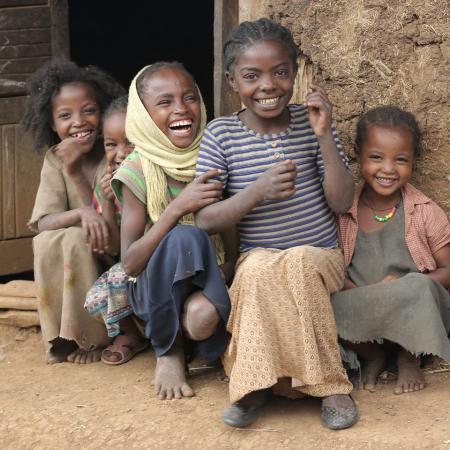
‘With our innovative approach we aim to help preserve Ethiopia’s forests while creating economic opportunities for the local population’.
Florian Hammerstein, Managing Director of Original Food GmbH.
[the full story will be added later]

